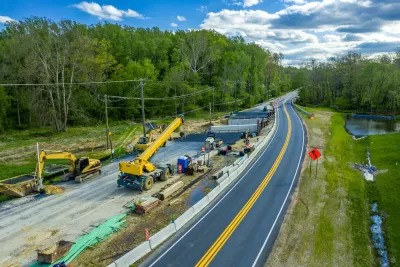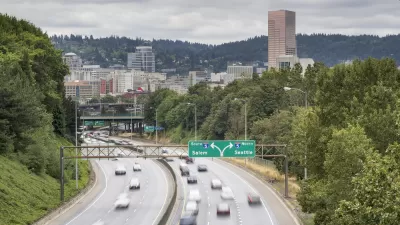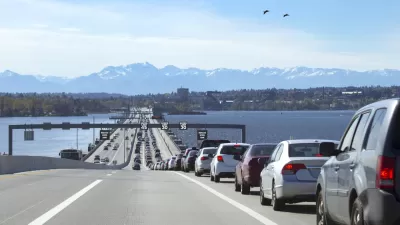New research shows that the economic benefits of roadbuilding projects don’t come close to exceeding most projects’ costs.

A new study published in the Journal of the American Planning Association highlights the high cost and low return of road expansion projects in urban areas, reports Maria Clara Cobo in Bloomberg CityLab. According to the study, the monetary value of purported time savings doesn’t have “anything close to the economic benefits that state and federal policymakers hope for.”
As Cobo explains, “The researchers considered several kinds of costs: They looked at direct government spending on roads, external costs such as pollution and traffic deaths and the value of roadway land that could otherwise be used for different purposes like housing, shops or public space.” When accounting for direct government spending alone, costs exceeded benefits by 17 percent.
However, the study focused on a new assessment of land value and how much space is dedicated to roadways, which adds significantly to the total cost of road projects. “Their estimate finds that roads account for a fifth to a quarter of all urbanized land in the US — that’s equal to the total area of West Virginia.” This land is valued at roughly $5.4 trillion in today’s dollars.
The research contradicts the popular belief — and assessments by the U.S. Department of Transportation (USDOT) — that highway widening projects benefit local economies. Moreover, “[The study finds] that reducing roadway area by 10% would yield a net benefit of nearly $28 billion a year.”
FULL STORY: The Outsized Cost of Expanding US Roads

Maui's Vacation Rental Debate Turns Ugly
Verbal attacks, misinformation campaigns and fistfights plague a high-stakes debate to convert thousands of vacation rentals into long-term housing.

Planetizen Federal Action Tracker
A weekly monitor of how Trump’s orders and actions are impacting planners and planning in America.

Chicago’s Ghost Rails
Just beneath the surface of the modern city lie the remnants of its expansive early 20th-century streetcar system.

Bend, Oregon Zoning Reforms Prioritize Small-Scale Housing
The city altered its zoning code to allow multi-family housing and eliminated parking mandates citywide.

Amtrak Cutting Jobs, Funding to High-Speed Rail
The agency plans to cut 10 percent of its workforce and has confirmed it will not fund new high-speed rail projects.

LA Denies Basic Services to Unhoused Residents
The city has repeatedly failed to respond to requests for trash pickup at encampment sites, and eliminated a program that provided mobile showers and toilets.
Urban Design for Planners 1: Software Tools
This six-course series explores essential urban design concepts using open source software and equips planners with the tools they need to participate fully in the urban design process.
Planning for Universal Design
Learn the tools for implementing Universal Design in planning regulations.
planning NEXT
Appalachian Highlands Housing Partners
Mpact (founded as Rail~Volution)
City of Camden Redevelopment Agency
City of Astoria
City of Portland
City of Laramie





























